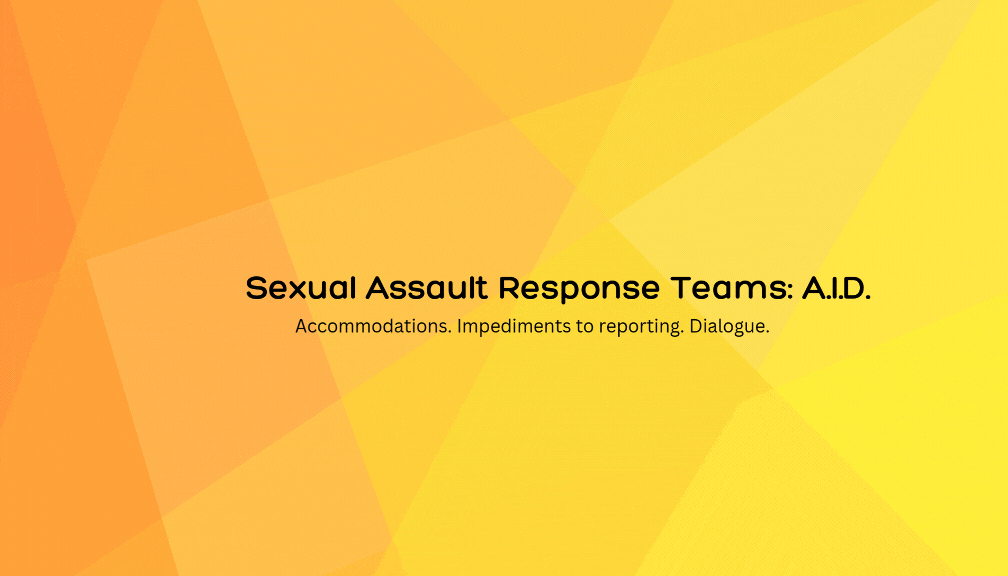Guidelines for Working With Clients With IDD
SART A.I.D.
Accommodations. Impediments to reporting. Dialogue.
SARTs are among NJ’s most vital social services; their knowledge, care, and dedication help mend the lives shattered by sexual violence. Because of their significance, it is crucial that the teams’ confidential sexual violence advocate (CSVA), forensic nurse examiner (FNE), and law enforcement officer become familiar with the characteristics and unique needs of all the different populations who comprise their communities.
People with intellectual and developmental disabilities (IDD) are seven times more likely to experience sexual violence than neurotypical people. Lack of sexuality and personal safety education combined with isolation, a culture of compliance, and reliance on others for care contribute to this likelihood. These individuals are also less apt to report violence or abuse due to fear of retribution or not being believed.
They also make up about 1/10 of New Jersey’s population.
The Arc of NJ’s Criminal Justice Advocacy Program and Sexual Violence Prevention Project have created a comprehensive primer on how to maximize SART interaction with people with IDD.
Our key word for working with citizens with IDD: AID.
Accommodations
Adjusting an approach can make administering care much more efficient and effective. Given the prevalence of sensory processing disorder within the neurodiverse community, an excess of stimuli may lead to overwhelm, overstimulation, or meltdown, particularly in times of distress. It is important to recognize that citizens with IDD possess distinct requirements and to accommodate them in order to facilitate treatment, increase communication, and prevent further trauma.
- Ask survivor about needs for communication and feeling safe, and offer examples (an advocate for supported decision-making, communication boards, translator, etc.)
- Divide meetings into sections and short breaks to reduce fidgety behaviors Offer physical assistance (but always ask before providing)
- Choose a comfortable meeting place with limited distractions and moderate noise/lights Be as flexible with meeting times as possible
- Think of sending reminders before meetings or due dates
- Allow the survivor time and space to calm down if there’s no threat of self-harm Offer breaks, whether for snacks, water, or emotional needs
- Always grant permission for service animals (it’s the law!); do not pet or distract animal while it is working
- Lower the intensity of police radio/sirens/patrol lights whenever possible
Impediments to reporting
Only 3% of sexual abuses involving people with developmental disabilities are ever reported. Reasons for this include lack of accessibility to services, limited knowledge of sexuality, and fear of perceived consequences like retaliation by the offender, not being believed, or loss of independence. The manner in which services are provided can mitigate these barriers.
Determine whether there is a guardianship in place and the extent of their authority before decisions are made
- Explore the need for a guardian or a change in guardianship (if the guardian is the suspected offender)
- Convey belief in the survivor’s account
- Assure the survivor that the assault was not their fault
- Discuss reporting - and non-reporting - options
- Understand that the survivor may be dependent on the abuser;
According to Disability Rights, “SART members should be aware of the potential for conflict among team members… when considering whether a victim who may be “mentally disabled” under the criminal statute can consent to medical treatment, whether there is a guardianship or other legal relationship in place that gives decision-making authority to another, and more broadly when considering whether the person considers themselves a victim.”
Dialogue
The manner in which law enforcement principles, medical concerns, and referrals for services are presented can adversely affect individuals with IDD who have experienced sexual violence. A survivor’s unfamiliarity with terminology or feeling confused or misunderstood can result in inadequate support, missed opportunities to identify and address abuse, retraumatization, and a lack of trust in the legal system. It is imperative for SARTs to ensure that all citizens grasp legal matters, medical procedures, and verbiage both prior to and throughout their experience. Meanwhile, they must also safeguard their own understanding of the individual and their situation.
- Ask, “Is there anything I should know that will enable me to better assist you?”
- Avoid using technical or medical jargon; assume the listener is not familiar with even the most common terms
- Allow stimming (repetitive motions such as rocking back and forth, hand flapping, etc.) - done safely - to process anxiety, instead of assuming that stimming indicates aggression Avoid compound questions (ex. “Where did it happen and how?”) which can confuse or overwhelm the survivor
- Forgo leading questions which suggest the existence of a fact (“Did you brother do this to you?”); people with IDD are more likely to respond “yes” to a question when they are confused or are unaware of whether something is true
- Ask open-ended questions
- Refrain from asking sets of questions that set a pattern on responses, such as a series with “yes” as their appropriate answers; pepper sets of questions with ones that should elicit varying responses
- Speak directly to the person, not to their advocate
- Actively listen
- Give appropriate praise and encouragement without patronizing
- Use a calm and even voice
- Be patient: allow for extra time for the individual with IDD to think about questions before responding
- Upon meeting, address the individual in a way that is clear and unambiguous. Introduce yourself and then explain your role in an easy-to-understand way.
- Use a trauma-informed approach: provide regular updates, allow involvement in decision-making, use terminology that aligns with the client’s experience, consider communicating by text or phone when possible
- Increase font size on written documents
- Always use people-first language (i.e. “person with disabilities,” instead of “disabled person”) Give an overview or provide an agenda of questioning or a forensic exam before beginning
In addition…
- Identifying markers of a disability is extremely helpful, particularly when the individual is unaware of or is not forthcoming with their diagnosis. Indicators of IDD may include: Communication issues: limited vocabulary, speech impairment, difficulty answering questions, short attention span
- Behavior issues: inappropriate demeanor, pliability, difficulty with directions, difficulty with simple tasks, repetitive motions or motor impairment
- Interaction issues: eagerness to please, communication through others, mimicking, feigning greater understanding, over- or under-engagement

